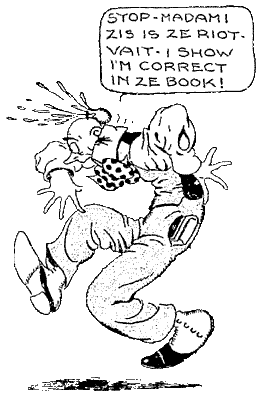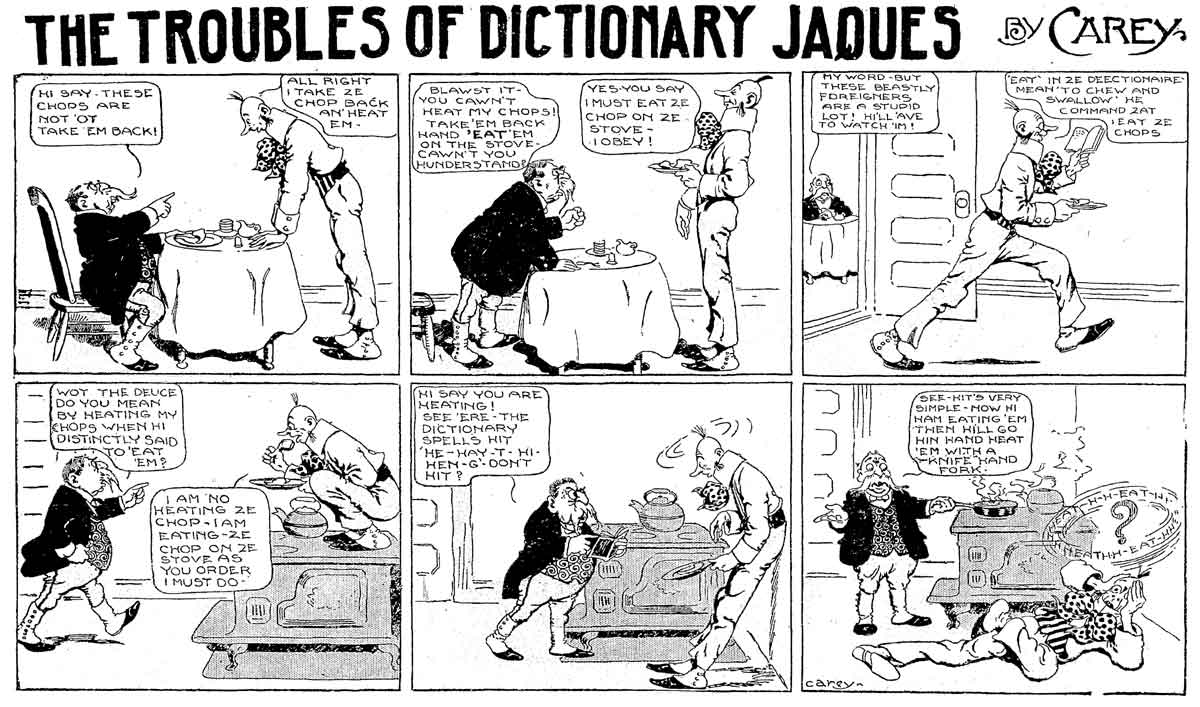The perils of polysemy
« previous post | next post »
 Among the many classic cartoons at Barnacle Press is Ed Carey's The Troubles of Dictionary Jaques [sic], from 1912-1913.
Among the many classic cartoons at Barnacle Press is Ed Carey's The Troubles of Dictionary Jaques [sic], from 1912-1913.
The strip's premise: Jaques is dependent on a dictionary for the interpretation of one critical word or phrase in each instruction he's given, while being unaware of the existence of polysemy and completely devoid of common sense.
In the example from which the illustrative detail on the right is taken, Jaques' employer introduces the new kitchen maid and tells him to "present her to the chef". Jaques looks up present:
"Zee deectionary say 'present' mean 'exhibit to view' — now I look up 'exhibit' Ah! Ze word 'exhibit' mean – 'force into notice'. I do so at once."
But it turns out that he wasn't actually supposed to shove her into the kitchen, grasp her firmly and lift her up so that the chef is forced to notice her.
It would make sense for Carey to have used the glosses from an actual dictionary. A bit of web search suggests that he might have found the "force into notice" phrase in the entry for display in the New Websterian 1912 Dictionary, although the entry for exhibit merely gives the gloss "to present to view; display; show; manifest publicly; present formally or officially; administer".
Carey also seems to have used a bit of poetic license in the several strips that depend on Jaques' inability to distinguish between the presence and absence of [h] at the start of words, or rather his tendency to get it exactly backwards, which is presented via the comedic premise that his aristocratic employer speaks a a sort of hypercorrecting Cockney in which [h] and non-[h] are reversed:

Charles Gaulke said,
April 25, 2010 @ 10:44 am
Jacques's employer must have pretty impressive lung capacity – I tried to read his lines out loud and my head is spinning.
Neal Goldfarb said,
April 25, 2010 @ 11:39 am
Jacques looks like an underfed proto-Zippy.
[(myl) He does! I had the same reaction. But the shared characteristics come from one of the traditional get-ups for circus clowns, don't they?]
Tom said,
April 25, 2010 @ 11:46 am
It looks to me like Jaques is getting [h] / non-[h] exactly the right way round in that strip (interesting, since an inability to pronounce initial [h] is one of the stereotypical features of French people speaking English that you might have expected his character to exhibit), but the confusion stems from his employer's weird hypercorrective accent that reverses the two.
[(myl) That's also the way it works out in this strip, where the employer asks "'Ow could we live hin a room without hair?" Perhaps this is really supposed to represent Jaques' difficulty in dealing with a bizarre accent, but it seems to me that it might also be an attempt to put us inside Jaques' perceptual space, so to speak.]
Tom said,
April 25, 2010 @ 11:47 am
And, of course, Jaques' total lack of common sense.
Aviatrix said,
April 25, 2010 @ 12:41 pm
That's the same concept as Amelia Bedelia, who stole the bases and took them home, then dusted the furniture with dusting powder.
Ray Girvan said,
April 25, 2010 @ 2:11 pm
Jacques looks like an underfed proto-Zippy
He reminds me of Sunny Jim.
Brian said,
April 25, 2010 @ 5:09 pm
I'm not sure what "hypercorrecting" means in this context, but weren't Cockney accents at the time frequently caricatured as exactly reversing their [h]s? I remember the constable's accent in Roald Dahl's "Danny, the Champion of the World" was the same way.
Dan T. said,
April 25, 2010 @ 6:24 pm
I seem to remember reading an essay, probably by Anthony Burgess, where, for some sort of political satirical purpose, he advocates that British society conform to the class needs of the Cockneys by adopting a mandatory accent that reverses the "h"s this way; continuing to speak the opposite way was insensitive to the social needs of the proletariat, and hence Politically Incorrect.
On the multiple meanings of "present", the book Ramona the Pest by Beverly Cleary features the title character, in her first day at kindergarten, being told by the teacher to "sit here for the present" (while the other kids are sorted out into their proper classes and seating locations), and hence expects to be given a present if she stays where she is. This means that even when recess time comes later, she refuses to budge because she hasn't gotten her present yet. (She also refuses to stand for the national anthem earlier, where she hears it as referring to some sort of lamp called a "Dawnzer" which produces "lee light".)
Bobbie said,
April 25, 2010 @ 6:58 pm
And then there is Amelia Bedelia of story-book fame. When asked to "dress the chicken" she put little frilly clothes on them. To "dust the furniture" she covered them with powder.
Ray Girvan said,
April 25, 2010 @ 8:21 pm
Dan T: I seem to remember reading an essay, probably by Anthony Burgess
I don't have it to hand at this instant, but that sounds like his satirical essay on "Worker's English" in the appendices to 1985.
Szwagier said,
April 26, 2010 @ 9:13 am
Wasn't the 'h' switching the same with Sam Weller in "Pickwick Papers"? Or was it only 'w' and 'v'? Don't 'ave time to check right now.
Ginger Yellow said,
April 26, 2010 @ 10:03 am
Seems like a forerunner of Viz's Mr Logic.
Ray Girvan said,
April 26, 2010 @ 5:26 pm
Ginger Yellow: Seems like a forerunner of Viz's Mr Logic
I remember, very vaguely, an annual for the 1946-52 Daily Mirror comic strip Jimpy (about a boy who had picaresque adventures) using very similar literalisms. On a pirate ship, Jimpy was ordered to "shoot the sun" and used a cannon instead of a sextant.
Fetcher said,
April 27, 2010 @ 3:08 pm
I'm playing a game called Blue Toad Murder Files, produced by a British company. The blustery chief detective character is constantly inverting his "h"s to the heffect of 'ilarity.
latinist said,
April 27, 2010 @ 6:28 pm
On the specific issue that Jacques has in this strip, I sympathize with him. When I was in Italy, I found that Italians, in speaking English, tended to have trouble distinguishing "hit" from "eat" — and, in a nice correspondence, "hungry" from "angry."
Hi ham sending greetings from Hengland said,
May 8, 2010 @ 12:18 pm
The reversing of /h/ distribution is indeed a legitimate feature of some varieties of English. I am from Jamaica where that tendency is rampant. my high school Chemistry teacher once told me a story almost identical to Jacques' that almost ended in a fight. Around Christmas time, the TV stations used to play video greetings that emigrants to other countries had sent for their family and friends back in Jamaica. I distinctly remember laughing hysterically at one woman who produced the following: "Hi ham sending greetings from Hengland. Appy Olidays!"
It's confusing to me as well how hyper-correction would cause a perfect reversal. I recall hearing a professor explain it once, but I've forgotten the explanation. does anyone have a plausible one?
wörterbuchjockel « lexikographieblog said,
May 19, 2010 @ 9:43 am
[…] Über Language Log werde ich auf The Troubles of Dictionary Jaques auf Barnacle Press aufmerksam. Comic Strips, […]